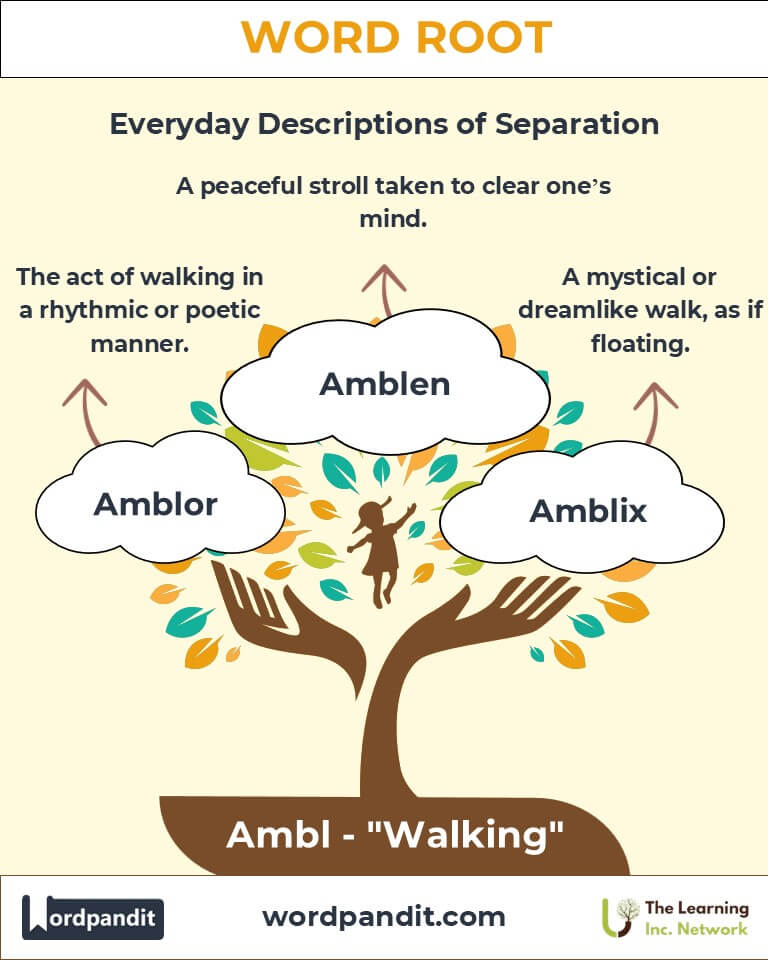Ambl: The Gentle Art of Walking Through Language
Discover the fascinating root "Ambl," derived from Latin, meaning "walking" or "to go." From leisurely ambles in the park to perambulating the streets of history, this root captures the essence of movement and journey in both physical and metaphorical senses.

Table of Contents
- Introduction: The Essence of "Ambl"
- Etymology and Historical Journey
- Mnemonic: Unlocking the Power of "Ambl"
- Common Ambl-Related Terms
- "Ambl" Through Time
- "Ambl" in Specialized Fields
- Illustrative Story: "Ambl" in Action
- Cultural Significance of the "Ambl" Root
- The "Ambl" Family Tree
- FAQs About the Ambl Word Root
- Test Your Knowledge: Ambl Word Root Quiz
- Conclusion: The Living Legacy of "Ambl"
1. Introduction: The Essence of "Ambl"
Picture a meandering stroll through a serene path. The word root "Ambl," pronounced am-bl, encapsulates this idea of walking or moving leisurely. Rooted in the Latin ambulare ("to walk"), it has contributed to a range of words that emphasize journey, movement, and exploration—both literal and figurative.
2. Etymology and Historical Journey
The root "Ambl" stems from the Latin ambulare, meaning "to walk" or "to go about." In ancient Rome, walking was not merely a mode of transportation but a philosophical exercise. As Latin influenced Old French and later English, derivatives of "Ambl" began to signify both the act of walking and the manner in which one moves.
In medieval times, terms like perambulate (to walk around) were used in legal contexts, such as marking property boundaries. Over the centuries, this root evolved, enriching both everyday language and specialized terminologies.
3. Mnemonic: Unlocking the Power of "Ambl"
To remember "Ambl," imagine a gentle stroll in the park, the rhythm of your steps matching the calm of the day.
Mnemonic Device: "Ambl is for ambling—a relaxed walk to savor the scenery."
4. Common Ambl-Related Terms
- Amble (am-bl): To walk leisurely.
Example: "After dinner, they decided to amble through the garden." - Perambulate (puh-ram-byuh-layt): To walk around, often to inspect.
Example: "The caretaker perambulated the estate every morning." - Ambulance (am-byuh-luhns): A vehicle designed to transport the sick or injured. Derived from ambulare, reflecting the movement required to carry patients.
Example: "The ambulance arrived within minutes of the call." - Ambulatory (am-byuh-luh-tor-ee): Capable of walking; related to movement.
Example: "After the surgery, the patient was ambulatory within a week." - Circumambulate (sir-kuhm-am-byuh-layt): To walk around something, especially as a ritual.
Example: "Pilgrims circumambulate the shrine as part of their devotion."
5. "Ambl" Through Time
- Ambulance: Originally a term for a movable hospital that followed troops in the 17th century, it evolved into its modern usage in the 19th century.
- Perambulation: Once a critical legal practice, this term now also describes leisurely walks that blend exploration with observation.
6. "Ambl" in Specialized Fields
- Medicine:
Ambulatory Care: Refers to medical services provided to patients who are able to walk and do not require hospital admission.
Example: "Ambulatory care has revolutionized outpatient treatments." - Law:
Perambulate: Used historically to describe the act of walking property boundaries for legal verification.
Example: "The surveyor perambulated the borders to resolve the dispute." - Spiritual Practices:
Circumambulate: Walking around a sacred site as part of a ritual.
Example: "Devotees circumambulate the stupa as a sign of reverence."
7. Illustrative Story: "Ambl" in Action
In a small English village, young Clara loved to amble through the fields, observing the flowers and streams. One day, she stumbled upon an old man perambulating the edges of a forest, inspecting the trees. Intrigued, she learned he was a botanist marking ancient species. Their shared walks not only deepened Clara's love for nature but also revealed a hidden world where every step uncovered stories of growth and history.
8. Cultural Significance of the "Ambl" Root
Walking has been central to human culture, from pilgrimages to philosophical strolls. The root "Ambl" reflects this timeless connection. In literature, an amble often symbolizes reflection, while rituals like circumambulation hold spiritual significance across cultures.
9. The "Ambl" Family Tree
- Grad- (Latin: "step"):
- Gradient: A slope or rate of incline.
- Gradual: Happening step by step.
- Mob- (Latin: "move"):
- Mobile: Capable of movement.
- Mobility: The ability to move freely.
- Curs- (Latin: "run"):
- Cursor: A moving indicator on a computer screen.
- Excursion: A short journey or trip.
FAQs About the "Ambl" Word Root
Q: What does "Ambl" mean?
A: The root "Ambl" means "walking" or "to go." Derived from the Latin ambulare, it signifies movement in a calm, deliberate, or exploratory manner, often associated with leisurely or purposeful walking.
Q: How is the word "ambulance" connected to walking?
A: The word "ambulance" comes from the Latin ambulare, meaning "to walk or move." Historically, it referred to a movable hospital that "walked" or traveled with troops in the battlefield to care for the wounded. This mobility reflects the essence of the root.
Q: What is the difference between "amble" and "perambulate"?
A: While both terms involve walking, "amble" refers to a relaxed, unhurried walk, often for pleasure. On the other hand, "perambulate" involves purposeful walking, such as surveying land or inspecting an area, highlighting its practical aspect.
Q: What does "ambulatory" mean in medical terms?
A: In medical contexts, "ambulatory" refers to a patient's ability to walk independently. It also describes medical care or procedures that do not require an overnight hospital stay, emphasizing the patient’s mobility.
Q: What is circumambulation?
A: Circumambulation is the act of walking around something, often as part of a religious or spiritual ritual. For example, in many cultures, devotees circumambulate sacred objects, shrines, or temples as a sign of reverence and devotion.
Test Your Knowledge: Ambl Word Root Quiz
1. What does "Ambl" signify?
2. Which word describes a leisurely walk?
3. What does "Ambulatory care" refer to?
4. What is the origin of "ambulance"?
5. What does "Circumambulate" mean?
10. Conclusion: The Living Legacy of "Ambl"
The root "Ambl" continues to stride through our language, connecting us to the fundamental act of walking. Whether leisurely ambling, purposeful perambulating, or ritualistic circumambulating, it embodies the essence of movement and exploration. Let "Ambl" inspire your next journey—step by step.











